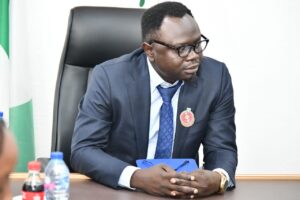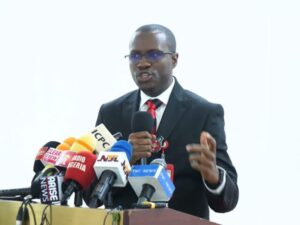Three years of Jamoh’s maritime tripod agenda
The Nigerian Maritime Administration and Safety Agency, NIMASAas a Safety Administration, implements International Convention for the Prevention of Pollution from ships, MARPOL, and safety of lives at sea, SOLAS, and the Standards of Training, Certification and Watch keeping for Seafarers STCW amongst others. When Dr Bashir Jamoh OFR was appointed to lead the management team of the Agency in March 2020, the vision was clearly stated in the triple -S agenda of Maritime Safety, Maritime Security and Shipping Development. This in practical terms was the navigable path to achieving the Agency’s mandate as set out in the NIMASA Act, the Merchant Shipping Act, the Cabotage Act, and the Suppression of Piracy and other related maritime crimes offences Act.To achieve this, Jamoh and his executive management team identified the need to have the Agency’s workforce on same page with them.
It’s a common saying that a well-motivated workforce is the foundation for any productive organization. The Jamoh led administration at NIMASA has been able to motivate staff for optimal productivity. Within the last three years over 1, 300 staff have been promoted from one grade level to another as , 595 in 2020, 302 in 2021 and 472 in 2022 were promoted. This administration inherited a staff condition of service which was last reviewed in 2010. Dr Jamoh and his team secured a review taking into consideration the realities on ground. NIMASA Management has shown commitment to staff capacity development as over 100 staff have benefited from long term trainings at the World Maritime University and other institutions offering training relevant to the industry. Other forms of capacity development for staff are ongoing.
It’s obvious that The Agency needs various types of vessels to be effective. Having inherited a regime of Hiring vessels from the private sector at a daily cost to function, NIMASA within the past three years have refurbished seven vessels mainly for Pollution Control and Prevention, Search and Rescue and Cabotage enforcement services. While the refurbishing of the vessels was done in conjunction with the Nigerian Navy at the Naval Dockyard in Lagos, NIMASA has gone further to acquire new vessels to enhance its services.
In terms of safety of navigation in Nigerian territorial waters, the current management at nimasa embarked on a project never done before. Wreck removal. As the saying goes, a journey of a thousand miles begins in a day. Jamoh has shown the way that wreck removal is actually a possibility with the first phase of removals going on course. This was done in conjunction with the Hydrographic Department of the Nigerian Navy in identifying the wrecks.Jamoh and his team also developed an environmental sensitivity index map of the Nigerian Coastline. This charting makes it easy to identify and tackle environmental issues in the maritime sector.
Shipping development also witnessed major milestone achievement by the Jamoh led administration. The disbursement of the Cabotage Vessel Financing Fund has been a challenge previous administrations found very challenging to implement due to its complex nature with over. It is noteworthy that NIMASA under the supervisions of the Federal Ministry of Transportation is at the verge of disbursing the funds. Presidential approvals have been received, Primary lending Institutions have been appointed and terms of accessing the funds are now been finalized for disbursement to commence next month.
When NIMASA under the watch of the current administration midwifed a forum for the Agency to constantly engage international stakeholders such a s BIMCO, INTERTANKO, INTERCARGO, OCIMF, ICS, and international oil companies under the auspices of the industry maritime security work group NIWG which latter transformed into the SHADE Gulf of Guinea, some persons may have underated the potentials of such international collaboration. The results are there for all to see. The improved international collaboration coupled with the enhanced partnership with the Nigerian Navy, security in Nigerian waters and by extension the Gulf of Guinea has greatly improved. Its on record that since the last quarter of 2021 the issue of piracy has become a thing of the past in Nigeria waters. The statistics on piracy and kidnapping in Nigerian waters speaks for itself. From 82 cases of piracy in Nigerian waters in 2018, 61 in 2019, 81 in 2020, down to 34 in 2021, and now to nil in 2022 and the first quarter of 2023. It’s obvious the team managing maritime security in Nigerian waters are doing something right and heading in the right direction.
This has gone a long way to restore international confidence in the Nigerian maritime industry. Just like you have in the political arena where endorsements are show of confidence in a candidate, the international community have been endorsing the Nigerian maritime industry for interested investors. First was the International Mariitme Bureau, IMB, who in March 2022 delisted Nigeria from the countries regarded as piracy prone regions. Just recently in 2023, the International Bargaining Forum, IBF removed Nigeria from the list of countries designated as risk maritime nations. This is a confirmation of the improved global ratings of Security in Nigerian maritime domain as a result of sustained collaborative efforts of the Nigerian Maritime Administration and Safety Agency, NIMASA, the Nigerian Navy, and international stakeholders.The International Bargaining Forum ,IBF, is a body that brings together the International Transport Federation, ITF, and the international maritime employers that make up the Joint Negotiating Group ,JNG,
After this endorsement came the visit of the IMO Secretary Geneneral, His Excellency Kitack Lim to Nigeria. This visit was the first in over a decade and a half that the world number one maritime citizen will step foot on Nigerian soil. For three days running the global maritime attention was on Nigeria. He commended NIMASA under the Jamoh leadership for effectively collaborating with the Nigerian Navy to rid Nigerian waters of piracy and other maritime crimes to barest level.
The Nigerian Seafarers Development Programme , NSDP,is another inherited project that has been improved upon the current leadership at NIMASA. Over 2,000 young Nigerians have benefited from this project to develop Marine Engineering, Nautical Science and Naval Architecture, of which many are now gainfully employed and sailing on both coastal and international vessels. The challenge with the inherited project was sea time. Within three years, all beneficiaries in the first and second phase have all undergone sea time and the new beneficiaries under phase two actually have sea time embedded in their own package. Under the new improved NSDP package, NIMASA has sponsored over 400 young Nigerians to seek career at sea as seafarers while noting the fact that over 800 out of the 2000 who commenced the first phase are now gainfully employed by multinationals and some onboard vessels.One can project that within a decade from now the next crop of seafarers from West Africa will be predominantly Nigerians.
The Maritime Academy of Nigeria in Akwa Ibom have also benefitted immensely from the current leadership at NIMASA. With the Agency investing without fail 5% of its revenue annually in the institution, MAN Oron can now boast of state of the art equipment including simulators to train cadets and extend same to other institutions in Nigeria.
In terms of Security in the maritime domain, one can readily point to the successful launch of the Deep Blue Project by President Muhammadu Buhari in June 2021, the use of the SPOMO Act to succefully prosecute criminals and pirates, the steady removal of Nigeria from the IMB Red List of Piracy prone countries in March 2022 amongst others.
When Jamoh and his team assumed office in 2020, the Integrated National Maritime Surveillance and Security Infrastructure project, otherwise known as the deep blue project was still at infancy. There were challenges deterring the Assets from arriving for use. Today, NIMASA has taken delivery of all assets under the project. Two special mission vessels, three special mission helicopters, 17 Armoured vehicles, two special mission aircrafts, 17 interceptor boats4 unmanned Aerial vehicles are now in country and fully deployed.
NIMASA under the watch of the current management created the maritime Intelligence Unit in 2020. This unit has played an active role in intelligence gathering and information sharing leading to major success in fighting crimes.
At this stage and with the clear achievements under Dr Bashir Jamoh, OFR,it’s clear that the Nigerian Maritime Administration and Safety Agency NIMASA is in safe hands, headed in the right direction, and it behooves on us all to trust the process as achieving the Seafarers Identity Document, SID, deployment of the Modular floating Dock, stemming of capital Flight, Capacity retention, the National fleet issue, and the imminent removal of Nigeria from the list of countries paying war risk Insurance premium are in focus for the next twelve months under the watch of Dr Jamoh and his management team.
Osagie Edward , FNIPR, is Head Public Relations NIMASA




